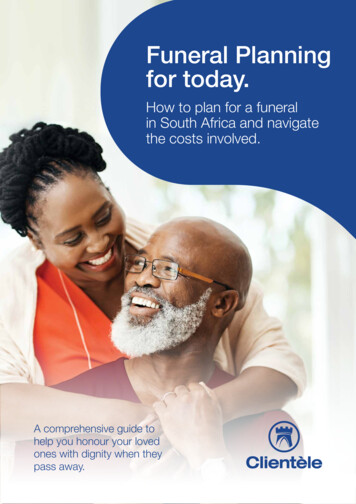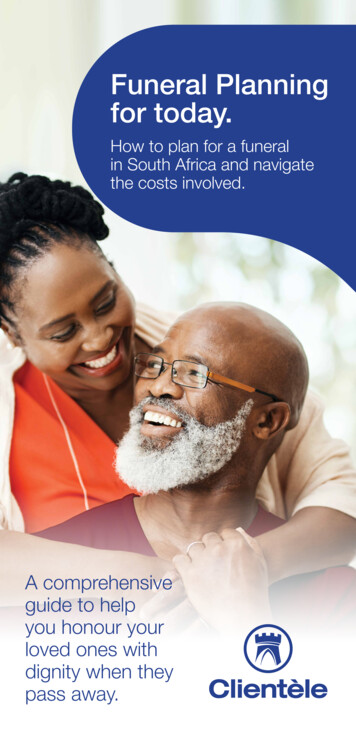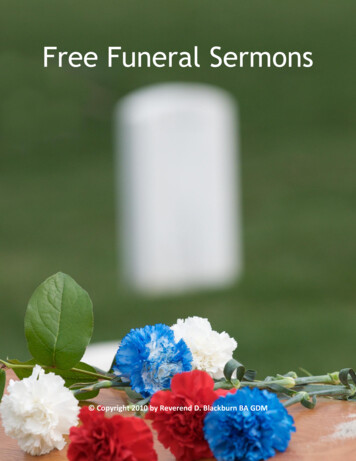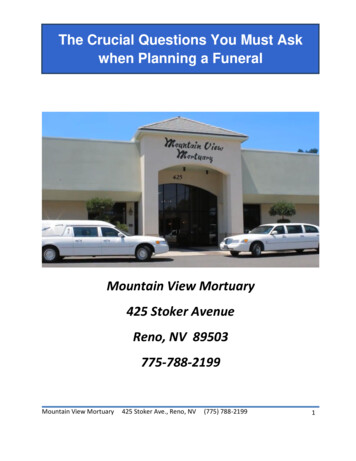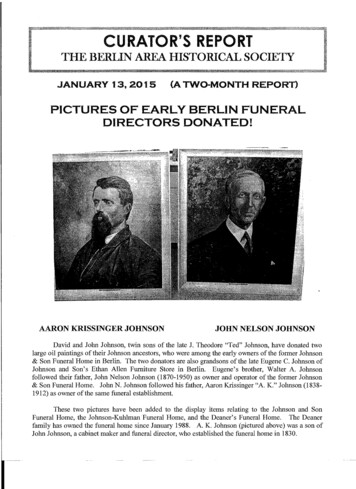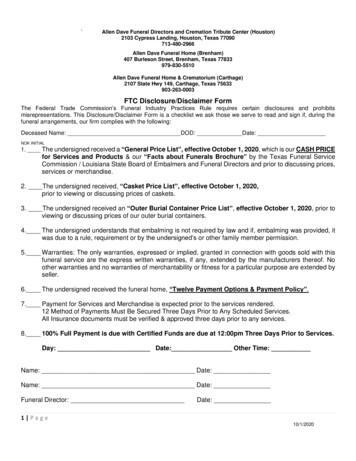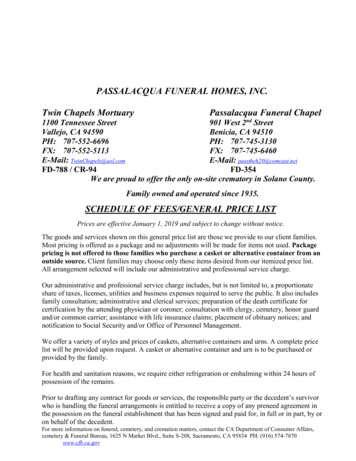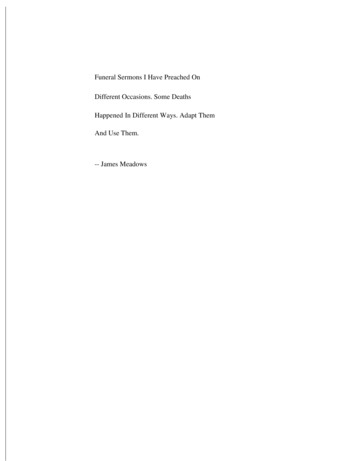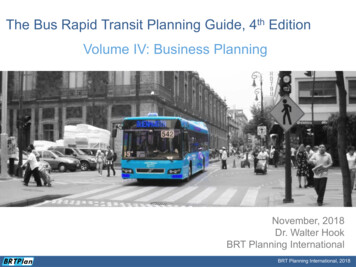
Transcription
Group LifeFuneral Planning GuideWhat You Need To Know
IntroductionSince a will is usuallynot read until afterthe funeral, it’s nota good place toindicate your funeralpreferences. It’s alsonot a good idea toput the only copy ofyour Funeral PlanningGuide in your safedeposit box, since yourfamily may not haveimmediate access tothe box following yourdeath.Throughout your life, you’ve been a source of emotional, physicaland financial support for your family members and friends. Withour Funeral Planning Guide, you can help support your loved onesat a time when they need it most. By documenting your funeralpreferences, as well as other key information for your survivors,you can provide support posthumously — a final act of love.Grieving family members and friends may be confronted with dozens of funeral planningdecisions — all of which typically must be made quickly and under great emotional duress.What kind of funeral should it be? What funeral provider should you use? Should youbury or cremate the body? What other arrangements should you plan? Whom should younotify? And, as unpleasant as it may sound, how much is it all going to cost, and wherewill the money come from to pay for it? Knowing and following your wishes can alleviatethe decision-making stress, and allow your loved ones to focus on their emotional needsand on other family matters that may arise during difficult times. Following the funeral,your financial affairs will need to be finalized, and the information you provide for yourloved ones will be invaluable in completing this task.This Funeral Planning Guide provides an easy-to-use format for documenting informationyour loved ones will need after your death: The “My Personal Information” section allows you to record details your family willneed for official records but that, in their grief, they may not be able to recall. The “My Funeral Plans” section makes it simple to detail your wishes regarding yourfuneral. Should you not wish to plan your own funeral, your loved ones can use thisinformation to do it for you. The “My Important Contacts and Information” section provides a place for youto record key information your loved ones may need following your death, such asinsurance and financial information.The Guide also provides you and/or your loved ones with information on funeral planningand on estate settlement, as well as descriptions of MetLife benefits that may be availableto you or your beneficiaries, and a list of additional resources you may need.Once you have completed the Funeral Planning Guide, it can be saved to your computer.As a backup, we recommend printing it out to keep with your other important papers.You may want to use the guide to initiate conversations with your family about otherend-of-life issues, as well. In any event, be sure to let your family know where thisinformation can be found, should they need it.** Note: MetLife neither captures nor stores any of the preferences or personal information you enter in the FuneralPlanning Guide. MetLife is not responsible for retention or communication to any third party of the contentsof your Funeral Planning Guide. MetLife suggests printing the completed guide and saving it in a secure placewith your other important personal information and documentation. This Planning Guide is provided to you forinformational purposes only and does not intend to cover all aspects of your specific circumstances. MetLife norany of its affiliates, employees or representatives provide specific tax or legal advice. Please consult an attorneyregarding your own personal situation.
Table of ContentsI. My Personal Information. 2A.Death Certificate Information. 2II. My Funeral Plans. 3III. My Important Contacts and Information. 9A.Key Contacts. 9B.Insurance Information. 11C.Important Information. 12IV. Funeral Planning Information. 15A.Prepaying. 15B.Preplanning. 15C.The Funeral Rule. 15D.Types of Funerals. 16E.Funeral Costs. 17F.Paying for the Funeral. 18G. Funeral Terms and Tips. 18V. Settling the Estate. 19VI. MetLife Benefits for You and Your Beneficiary(ies). 21A.How do you know if you have enough life insurance to meet yourfamily’s needs?. 21B.Face-to-Face Will Preparation. 22C.Face-to-Face Estate Resolution ServicesSM(ERS). 22D.WillsCenter.com. 23E.Grief Counseling. 23F.MetLife Delivering The Promise (DTP). 23G. Total Control Account (TCA). 24H.Metlife Infinity . 24VII. The MetLife Death Claim Process. 24VIII. Additional Resources . 251
I. My Personal InformationA. Death Certificate InformationYour loved ones will need the following information about you in order to obtain a death certificate:Full Legal Name:First NameMiddle NameLast NameSuffix (Sr.,Jr., III, etc.)Last NameSuffix (Sr.,Jr., III, etc.)Other Names By Which You May Be Known:First NameMiddle NameSocial Security Number:Date of Birth:City & State of Birth:Ethnic or Cultural Heritage:Your Maiden Name:Mother’s Maiden Name:Father’s Name:Marital Status: Married Never Married Widowed DivorcedSpouse / Domestic Partner Name:Wedding / Registration Date & Place:Your Children:First NameMiddle NameWere you ever in the Armed Forces? YesLast NameDate ofBirthcity & state OF birth NoIf Yes, What Branch or Country:2
Education:High schoolNameCity & StateHighest Grade Completedor Degree EarnedCollegeNameCity & StateHighest Grade Completedor Degree EarnedOTHER PERSONAL IDENTIFICATION NUMBERSDriver’s License # / State:Visa #:Passport # / Issuing Country:Green Card #:II. My Funeral PlansRecord your final wishes below to assist your grieving family in making the final arrangements you desire. Thisinformation will provide a “road map” your loved ones can follow to memorialize your life. Knowing they are fulfillingyour final requests will give them peace of mind during a very difficult time.People I’d like personally notified of my death:Name: Phone #:Name: Phone #:Name: Phone #:Name: Phone #: I have a prepaid funeral plan:Provider’s NameAddressPhone NumberPlan # or Other IdentifierName of Cemetery & Plot #Location of Documents3
I do NOT have a prepaid funeral plan. I would like my funeral to be in accordance with the preferences I’vedocumented below:Arrangements should be made by (select all that apply): My Spouse My Father My Mother My Children A Sibling OtherI would like my remains to be handled as follows: Ground burial in a private cemetery (specify): I have purchased a plot (specify plot #): I have not purchased a plot Interred in a national cemetery (eligible veterans, and eligible family members)Interred in a mausoleum (specify): I have purchased a crypt (specify #): I have not purchased a cryptCremation, with cremated remains (ashes): Interred in mausoleum (niche) Interred in burial plot Scattered (specify where — check local, state and federal laws) Other (please explain)I have registered to donate my body/organs to (specify): They will return my remains (ashes), which should be:4 Interred in mausoleum (niche) Interred in burial plot Cremation Other (please explain)
I would like a: Traditional funeral, followed by burial or cremation Direct burial or cremation, followed by a memorial service Direct burial or cremation, no memorial service Other (please explain)Traditional Funeral/Memorial Service PreferencesVisitation and viewing preferences (if applicable): At the funeral home At place of worship Open casket Viewing only at the funeral home prior to ceremony No viewing/no open casket I’m not sure Other (please explain)Calling hours (if applicable): Traditional hours Other (please explain) N/APersonal preferences (if applicable):Glasses to be worn Yes NoIf “Yes” Glasses to remain with me Remove before interment and return to:Jewelry to be worn (specify): Jewelry to remain with me Remove before interment and return to:Specific clothing:Other: N/A5
Ceremony preferences (if applicable): No ceremony Funeral ceremony at place of worship (specify): Funeral ceremony at funeral home (specify): Graveside ceremony only Memorial ceremony at (specify): Other (please explain)Ceremony officiant (i.e., clergy/speaker)(if applicable):First choice: Phone #:Second choice: Phone #:Other Speakers: Phone #:Special affiliations for my ceremony should include: N/A MILITARY Ceremony (specify): LODGE Ceremony (specify): OTHER Ceremony (specify):Some things I would like to have shared at the ceremony would be (you may wish to attach additional pages):Marker/headstone preferences (if applicable):Type of marker/headstone desired:Inscription desired:Pallbearer suggestions (if applicable):6
Music preferences (if applicable): N/A No music Pre-recorded music (specify): Live music Soloist (specify): Group (specify): Musician(s) (specify): Special songs to include (specify): Congregational singing (with the following songs):Requested readings, poetry or religious text (if applicable):Flower preferences (if applicable): N/A Casket spray Lid arrangement Standing spray Matching baskets Specialty pieces (i.e., floral hearts or religious symbols) Other (please explain) No flowersIn lieu of flowers, memorial donations to the following organizations, ministries and/or charities:Name:Address:Name:Address:7
SPECIAL NOTES AND WISHESObituary — I’d like the following included:Hobbies and/or personal interests:Clubs, lodges, membership in various organizations, church affiliation and activities:Military service:Special recognition and/or achievements:Other information:Survived by (additional pages may be added): name, relationship, city & state8
Pre-deceased by (additional pages may be added): name, relationship, year of deathIs there any specific information you do not wish to be shared?III. My Important Contacts and InformationA. Key ContactsPersonal Advisors can be invaluable in assisting your family members during the difficult time following your death.Give your family easy access to contact them by filling in the information below as accurately as possible.AdvisorNameTelephone surance AgentStockbrokerBankerEmployerLandlordDoctor (general)Doctor (specialist)DentistOtherOtherOther9
EMPLOYER(S)1. Current/Most Recent Employer:Name:Employer Address:Telephone : Hire Date:Employee ID#:2. Former Employers:Name:Employer Address:Telephone : Hire Date:Employee ID#:Name:Employer Address:Telephone : Hire Date:Employee ID#:VOLUNTEER ORGANIZATION:Organization Name:Role:Member #:Contact Information:UNION AFFILIATION (if applicable):Union Name:Local:Member #:Contact Information:MILITARY SERVICE BRANCH (if applicable):Rank:Serial #:Discharge Date:Contact:10
B. Insurance InformationIn today’s busy life, it’s difficult to remember the details. And even though you may have told your family about detailslike your medical insurance company, or where you’ve worked, chances are they don’t remember. Help simplify mattersfor your family by providing the pertinent details they may need to submit claims or ask about survivor benefits.HEALTH INSURANCE COMPANIESMedical:Type of coverage: Group Individual Medicare Medicare SupplementInsurance Company:Health Care Plan ID#:Group ID #:Contact Name:Telephone:Type of coverage: Group Individual Medicare Medicare SupplementInsurance Company:Health Care Plan ID#:Group ID #:Contact Name:Telephone:Insurance CompaniesInsurance TypePolicy #Insurance Company NameContact InformationLifeLifeLifeAnnuityAnnuityAccidental Death &DismembermentDentalDisabilityLong-Term CareHomeownersCarCarOtherOtherOther11
C. Important InformationYour Executor/Administrator or family will need to gather a variety of documents following your death in orderto settle your affairs. Recording the location of these key documents below can simplify this process, and make itless stressful.1. Location of Key DocumentsDocumentLocationWillBirth CertificateCitizenship CertificateMilitary DischargeDiplomasInsurance PoliciesMarriage CertificateDivorce Decree/AnnulmentTrust DocumentsProperty Deed(s)Vehicle Title(s)PassportSocial Security CardSafe Deposit Box KeyAdoption Papers2. Financial InformationYour family or your Executor/Administrator will need information about your assets after your death. Simplify theprocess by compiling your asset information below.a. AssetsBankAccount TypeSafe Deposit BoxSavingsSavingsCheckingMoney MarketATM/Debit CardCertificate of DepositMaturity DateCertificate of DepositMaturity DateIRARoth IRA12Account #Bank Name
INVESTMENTACCouNT TYPEAccount #INSTITuTIoN NAMEBrokerage AccountContact Name & Phone #Mutual Fund AccountContact Name & Phone #IRAContact Name & Phone #PENSIoN(S)TYPEACCouNT #SPoNSoR NAMECompany PensionPlan AdministratorContact Name & Phone #Company PensionPlan AdministratorContact Name & Phone #Union PensionUnion Name & Local #Plan AdministratorContact Name & Phone #401(k) 403(b) PlanPlan AdministratorContact Name & Phone #401(k)/403(b) PlanPlan AdministratorContact Name & Phone #PRoPERTYTYPEDESCRIPTIoNLoCATIoNReal EstateReal EstateReal EstateAutoAutoBoatRVMotorcycleArt WorkJewelryCollectionsOtherOther13
b. LiabilitiesIn addition to your assets, your Executor/Administrator or family will need information about any outstandingdebts that you have. To simplify the process, compile your liability information below.LoansTypeAccount #Lender Name1st Mortgage2nd MortgageHome Equity Line of CreditReverse OtherCredit CardsCompany Name14Card #Exp. DatePhone #
IV. Funeral Planning InformationAvoid putting the onlycopy of your preferencesin a safe deposit box, sinceit may not be immediatelyaccessible. Instead, keepa copy at home, perhapswith a list of your safedeposit box contents.Planning a funeral means different things to different people. Some people prepay fortheir funeral arrangements in advance, while others may simply preplan. When a lovedone passes away without making specific funeral arrangements, survivors should try tolocate any written instructions that can help them navigate through the process, whilefulfilling the final requests of the deceased.A. PrepayingMillions of Americans have contracted with funeral service providers to pre-arrangetheir funerals and prepay a portion or all of the expenses involved. Individual state lawsregulate the prepayment of funeral goods and services; these protections may varywidely from state to state. Some state laws require funeral homes or cemeteries to placea percentage of the prepayment in a state-regulated trust, or to purchase a life insurancepolicy with the death benefits assigned to the funeral home or cemetery. However, somestate laws offer little or no effective protection.If you do decide to prepay, make sure you understand exactly what’s included in theprice. Are you buying only merchandise, like a casket, or are you purchasing the wholefuneral package? Some additional questions to ask yourself if you are consideringprepayment are: re you protected if the company you’ve contracted with closes its doors, becomes Ainsolvent or otherwise goes out of business? What happens to the money you’ve prepaid? What are your state’s requirements? hat happens if you relocate, retire to a new state or die while away from home? WSome prepaid funeral plans can be transferred at an added cost. an you make changes to the plan, or even cancel the contract and get a refund, if Cyou change your mind? hat happens to the interest income on money that is prepaid (if money is placed Winto a fund)?B. PreplanningPreplanning does not involve any contractual or monetary obligations. It simply meansthat you make decisions about your final arrangements during your lifetime. To helpensure that your wishes can be carried out after your death, it’s important to documentthem, and to let your family members know where that documentation can be found.C. The Funeral RuleMost funeral providers are kind, caring professionals, who work hard to serve theirclients’ needs and best interests. In order to ensure this same treatment for everyone,there is a federal law that makes it easier for you to choose only those goods andservices you want or need, and also to pay only for those you select, whether you areplanning for yourself in advance or at the time of a loved one’s death.15
The Federal law, known as the Funeral Rule 16 CFR Part 453, is enforced by the FederalTrade Commission (FTC). It requires funeral directors to provide consumers with accurate,itemized price information and various disclosures regarding funeral goods and services.Itemized pricing must be provided to individuals in person and, if you ask, over thephone. For example, the funeral home must give you a written price list to keep thatshows the goods and services the home offers. If you want to buy a casket or outerburial container, the funeral provider must show you descriptions of the availableselections and the prices before actually showing you the caskets.In addition, the FTC publication, “Funeral: A Consumer Guide” states that under theFuneral Rule: ou have the right to choose the funeral goods and services you want (with some Yexceptions). The funeral provider must state prices in writing on the general price list. I f state or local law requires you to buy any particular item, the funeral provider mustdisclose it on the price list, with a reference to the specific law. T he funeral provider may not refuse, or charge a fee, to handle a casket you boughtelsewhere. A funeral provider that offers cremations must make alternative containers available.Many funeral providersoffer various “packages” ofcommonly selected goodsand services that make upa funeral. However, whenyou arrange for a funeral,you have the right to buyonly the individual goodsand services you want, andyou don’t have to accepta package that includesitems you do not want.D. Types of FuneralsFuneral practices are influenced by religious and cultural traditions, costs and personalpreferences. These factors help determine whether the funeral will be elaborate orsimple, public or private, religious or secular, and where it will be held. The informationbelow describes common types of services.1. Traditional or Full-Service FuneralThis is the most common type of funeral service, and is generally the most expensive.It usually includes a viewing or visitation, a formal funeral service at a funeral homeor place of worship officiated by a cleric or other official, use of a hearse to transportthe body to the funeral site and cemetery, and burial, entombment or cremation ofthe remains. There may be additional costs to be factored in, such as embalming anddressing the body, vehicles to transport the family if they don’t use their own, a casket,cemetery plot or crypt, and for other funeral goods and services.2. Direct BurialThe body is buried shortly after death, usually in a simple container. No viewing orvisitation is involved, so no embalming is necessary. A memorial service may be held atthe graveside or later. Direct burial usually costs less than the “traditional,” full-servicefuneral.3. Direct CremationThe body is cremated shortly after death, without embalming. The cremated remainsare placed in an urn or other container. No viewing or visitation is involved, althougha memorial service may be held, with or without the cremated remains present. Theremains can be kept in the home buried in a cemetery or buried/scattered in a favoritespot (check local, state and federal laws). Direct cremation usually costs less than thefull-service funeral.16
E. Funeral CostsPlanning a funeral can be emotionally and financially draining. Although nothing canalleviate the emotional strain, it is possible to minimize the financial drain. The costsassociated with a funeral can vary widely, depending on the funeral provider, and thefuneral goods and services chosen. As a consumer, it’s important to request a price listso you can determine which funeral goods and services you wish to include, and resistthe urge to spend more than you want, or can afford.1. Commonly Included Costs Basic services fee for the funeral director and staff — Basic service fees includeservices that are common to all funerals, regardless of the specific arrangement.These include funeral planning, securing the necessary permits and copies of deathcertificates, preparing the notices, sheltering the remains, and coordinating thearrangements with the cemetery, crematory or other third parties. harges for other services and merchandise — These are costs for optional goods Cand services such as transporting the remains, embalming and other preparation, useof the funeral home for the viewing, ceremony or memorial service, use of equipmentand staff for a graveside service, use of a hearse or limousine, a casket, outer burialcontainer or alternate container, and cremation or interment. ash advances — Some funeral homes charge extra for goods and services bought Cfrom outside vendors on your behalf, including flowers, obituary notices, pallbearers,officiating clergy and organists and soloists. Some funeral providers add a servicefee to their cost. The Funeral Rule requires those who charge an extra fee to disclosethat fact in writing, although it doesn’t require them to specify the amount of theirmarkup.2. Calculating the Actual CostThe funeral provider must give you an itemized statement of the total cost of the funeralgoods and services you have selected when you are making the arrangements. If thefuneral provider doesn’t know the cost of the cash advance items at the time, he or sheis required to give you a written “good faith estimate.” This statement also must discloseany legal, cemetery or crematory requirements that any specific funeral goods or servicesbe purchased.Funeral Provider Cost ComparisonProvider NameItemPricePricePriceNon-declinable basic services feeRemoval/transfer of remains to funeral homeEmbalmingOther preparation of the bodyUse of facilities/staff for viewingUse of facilities/staff for funeral ceremonyUse of a hearseBasic memorial printed packageCasketVaultTotal Cost17
3. “Funeral Provider Cost Comparison” FormYou may want to use the above“Funeral Provider Cost Comparison” form to gatherinformation about the costs associated with commonly used funeral goods and servicesin your area.F. Paying for the FuneralTraditionally, casketshave been sold only byfuneral homes. However,they are now availablefor purchase at severalfamous wholesale andoutlet stores. The FuneralRule requires funeralhomes to agree to usea casket you boughtelsewhere, and doesn’tallow them to charge youa fee for using it.Most funeral providers do not offer a deferred payment plan for funeral expenses,because trying to collect at a later date may be difficult, time consuming and costly.Unless it has been pre-paid, payment must typically be made when services arerendered. Cash, credit cards, life insurance proceeds and loans are the most commonlyused methods of payment.Life InsuranceMany people purchase life insurance coverage to help provide financial security for theirloved ones when they die, and to cover final expenses. When life insurance proceedsare used to pay funeral costs, the Beneficiary can “assign” a portion of the insuranceproceeds to the funeral provider. Paperwork is typically handled by the funeral provider,who will have the Beneficiary sign an “Assignment” form authorizing the insurancecompany to pay the funeral provider a specific amount of the insurance proceeds (equalto the funeral costs) before paying the Beneficiary.G. Funeral Terms and TipsIf you or a family memberhave a problem concerningfuneral matters, it’s best totry to resolve it first withthe funeral director. If youare dissatisfied, the FuneralConsumer’s Alliance maybe able to advise you onhow best to resolve yourissue. You can also contactyour state or local consumerprotection agencies listed inyour telephone book, or theFuneral Service ConsumerAssistance Program. You canfile a complaint with the FTCby contacting the ConsumerResponse Center by phone,toll-free, at 1-877-FTC-HELP(382-4357).CasketsFor a “traditional,” full-service funeral:A casket often is the single most expensive item you’ll buy if you plan a full-servicefuneral. Caskets vary widely in style and price, and are sold primarily for their visualappeal.Cemeteries - PrivateWhen you are purchasing a cemetery plot, consider the location of the cemetery. Otherimportant points you may want to consider include the type of monuments or memorialsthe site allows, and whether flowers or other remembrances may be placed on graves.Cost is another consideration. Cemetery plots can be expensive, especially inmetropolitan areas, and there may be charges for opening and closing the grave. Most,but not all, cemeteries require you to purchase a grave liner, which will cost severalhundred dollars.Cemeteries - VeteransBurial benefits for veterans include a gravesite in a national cemetery, opening andclosing the grave, perpetual care, a headstone or marker, a burial flag, and a PresidentialMemorial Certificate, at no cost to the family. Cremated remains are buried or interred innational cemeteries in the same manner and with the same honors as casketed remains.This eligibility also extends to some civilians who have provided military-relatedservice, and some Public Health Service personnel.Burial benefits may also be available for eligible spouses and dependents of veterans,even if they predecease the veteran. For more information, visit the Department ofVeterans Affairs’ Web site at www.cem.va.gov. To reach the regional Veterans office inyour area, call 1-800-827-1000.18
CremationMany families who opt to have their loved ones cremated rent a casket from the funeralhome for the visitation and funeral, eliminating the cost of buying a casket. If youopt for visitation and cremation, ask about the rental option. For those who choose adirect cremation, without a viewing or other ceremony where the body is present, thefuneral provider must offer an inexpensive unfinished wood box or alternative container, anon-metal enclosure — pressboard, cardboard or canvas — that is cremated with the body.If you do not have awill, review your MetLifeSupplemental Group LifeInsurance benefits carefully.Your coverage may includeMetLife’s Face-to-Face WillPreparation Services1 whichallows unlimited access toparticipating plan attorneysto prepare and update awill at no cost. If you do nothave MetLife’s SupplementalGroup Life Insurance, youcan download andprepare a will thoughwww.willscenter.com2Review your MetLifeSupplemental Group LifeInsurance benefits to seeif your coverage includesMetLife’s Face-to-FaceEstate Resolution Services1benefit that can help yourExecutor/Administrator andbeneficiary navigate throughthe probate process to settleyour estate.2Death CertificateThis legal document is issued by a government official of the jurisdiction in which thedeath occurred, and typically includes the location, date and cause of death, as wellas the deceased’s identifyin
Planning Guide. MetLife is not responsible for retention or communication to any third party of the contents of your Funeral Planning Guide. MetLife suggests printing the completed guide and saving it in a secure place with your other important personal information and documentation. Th
